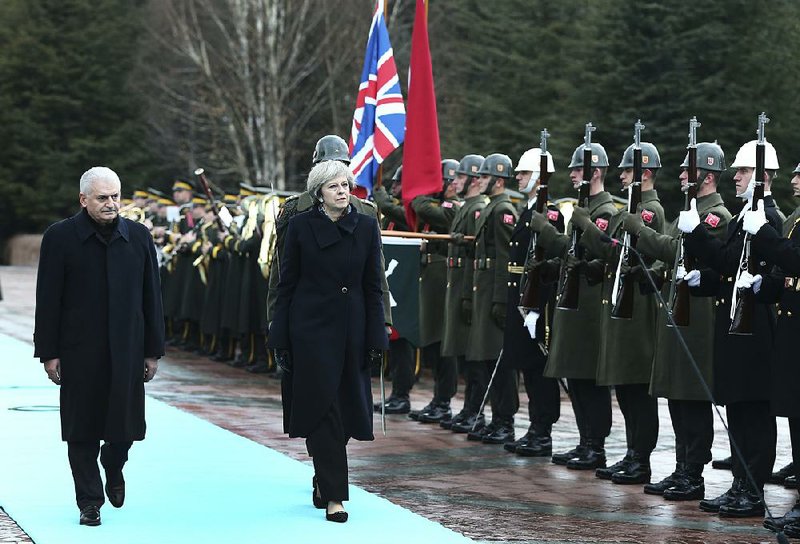ANKARA, Turkey -- Turkey and the United Kingdom signed a deal to jointly build fighter jets during Prime Minister Theresa May's visit to Ankara on Saturday, even as the U.K. leader called on Turkey's government to uphold democracy and abide by human-rights standards.
The U.K.'s BAE Systems, formerly British Aerospace, and Turkish Aerospace Industries Inc. signed the $125.5 million agreement establishing a partnership for the development of Turkey's fighter jet program after May met with Turkish President Recep Tayyip Erdogan and other Turkish officials about boosting trade between the countries once the U.K. leaves the European Union.
The two countries agreed to start preparatory work for a future free trade agreement and also talked about increasing cooperation in security and counterterrorism.
"This agreement underlines once again that Britain is a great, global, trading nation and that we are open for business," May said of the fighter jet deal, according to a statement. "It marks the start of a new and deeper trading relationship with Turkey and will potentially secure British and Turkish jobs and prosperity for decades to come."
May flew overnight to Ankara from the U.S., where she and U.S. President Donald Trump on Friday proclaimed a new chapter in the trans-Atlantic "special relationship."
The visit to Turkey, an important but complicated NATO ally, came as pressure mounts in the U.K. to condemn Turkey's clampdown on civil liberties since the government crushed a coup attempt in July.
"I am proud that the U.K. stood with you on the 15th of July last year in defense of your democracy," May said as she and Erdogan delivered brief statements to the media after their talks.
"And now it is important that Turkey sustains that democracy by maintaining the rule of law and upholding its international human-rights obligations -- as the government has undertaken to do," she said.
Turkey has detained tens of thousands of people suspected of links to a movement led by U.S.-based Muslim cleric Fethullah Gulen, whom the government accuses of orchestrating the failed coup attempt. More than 100,000 others have been dismissed from government jobs.
The crackdown extended to other government opponents. More than 100 journalists and pro-Kurdish party leaders are in jail.
During a joint news conference with May, Turkish Prime Minister Binali Yildirim strongly criticized Trump's move to suspend the admission of migrants and refugees, saying "you cannot settle this issue by building walls."
"Nobody leaves their homes for nothing," said Yildirim, whose country has admitted some 3 million migrants and refugees. "They came here to save their lives, and our doors were open. And if the same thing happened again, we would do it again."
Yildirim also complained of insufficient backing for Turkish efforts to support migrants and refugees, saying the expression of "appreciation" to Turkey was "not enough."
May said of Trump's announcement on refugees: "The United States is responsible for the United States' policy on refugees."
May, who was paying her first visit to Turkey since becoming prime minister, arrived for talks with Erdogan to find her image dominating television screens in the presidential palace, which were showing footage of her visit to the White House.
May laughed when Erdogan said her trip to Washington "was well-covered in Turkey."
In his statement, the Turkish leader said the two countries would aim to increase their bilateral trade volume from the current $15.6 billion to some $20 billion.
Earlier, May laid a wreath in the red and white colors of the Turkish flag at the tomb of Mustafa Kemal Ataturk, founder of the modern Turkish Republic, before meeting Erdogan at the presidential palace.
She said the U.K. and Turkey should "renew our efforts to fulfill Ataturk's vision of peace at home and peace in the world."
A Section on 01/29/2017
